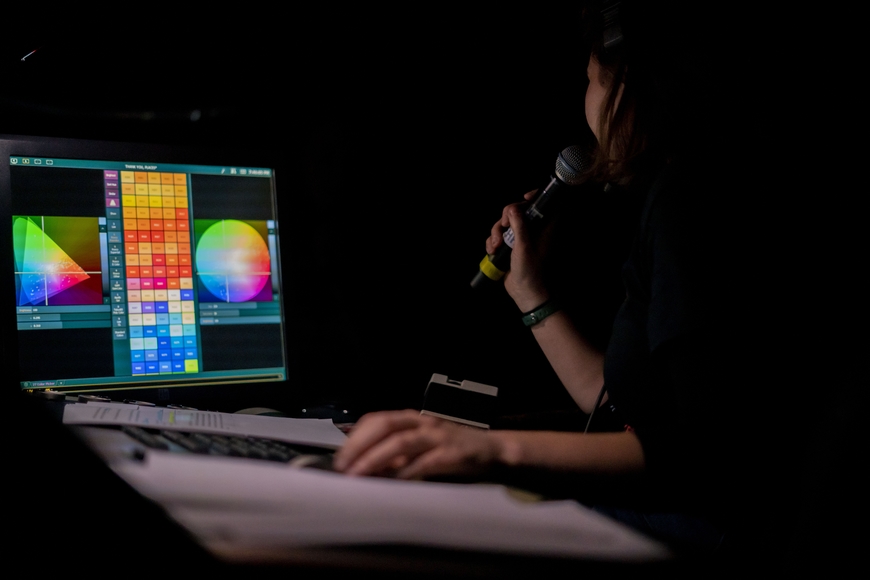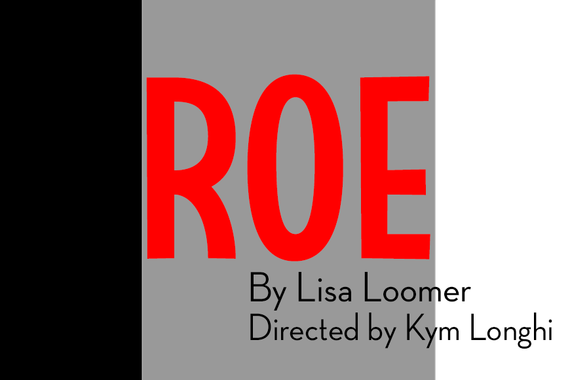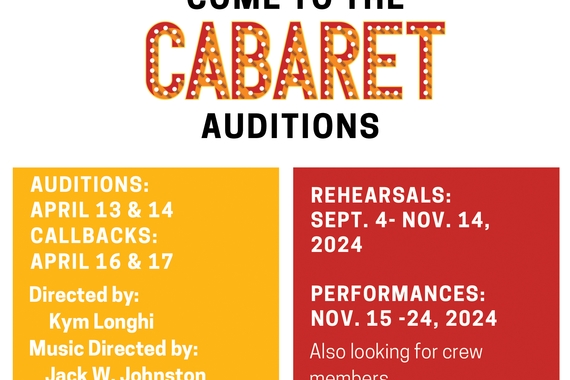Ellie Simonett: Life Behind the Scenes and on the Stage
Recent graduate Ellie Simonett was appointed as the new president of the United States Institute for Theatre Technology (USITT) in spring 2019. Through her incredible work on the technical side of theatre production, including lighting and sound, she is recognized as a prominent and well-respected female figure in the UMN theatre community. Below, she shares how she transformed from high school stagehand to president of USITT.
What roles do you play in the theatre community?
I have worked at a few theatres around town, programming or being a general electrician, but most of the work I've done has been assistant design work for different designers, and most of my credits have been from the U of M theatre department. My focus is usually lighting, but I have worked in scenic and sound.
What experiences led you to where you are now?
In high school, I was very dedicated to my theatre department, and I stage-managed quite a few of the shows—mostly musicals. Our technical director brought a few of the tech students to Las Vegas every other year to see Cirque Du Soleil shows and get tours of the backstage. It was during one of these shows that I realized what I wanted to do: I wanted to help create the magic of what theatre is.
When we returned [from Las Vegas], I had a real passion to pursue a career in theatre. I knew it was going to be difficult, but it was always worth it. From the first day of classes at the U of M, I have been involved with the theatre department. I started off volunteering in the Light Lab and was later hired as a TA. Then, I began working on shows as the assistant lighting designer, later designing a few shows myself.
How did you embrace the role of president of USITT?
When I was elected by my peers [in spring 2019] to be the president of our student chapter, I realized how much people rely on me and how they were willing to trust me in this position of power. I knew I wanted to do everything I could to make sure that everyone else saw this organization as a place to further your education and to create a community of peers who support each other.
[Being elected] allowed me to be a voice for my peers to the faculty and administration, and so I became a liaison between faculty and students. It made me more available to my peers to help them acclimate to the department. People started to see me as a leader, which helped me see it too.
How does USITT prepare its members for working in the theatre industry?
Our student chapter is a great place for interacting with fellow technicians and designers for learning more about our trade. We bring in local professionals to talk about a variety of theatre topics from design to management. Our group members can expect to see shows with peers, make connections in the Twin Cities theatre community, and explore branches of technical theatre. Our largest engagement with the UMN community this past year was our fundraiser show called Thank You, Places. It was completely organized, performed, and designed by undergrad UMN students. MinnesoTap was the only formal student group that performed, but all our other acts were solo performances or collectives of friends.
What does it mean to you to be an accomplished woman in the theatre industry right now?
As a female in the theatre industry, everything is a little bit more daunting. At all of the places I've worked, I have never once felt “less than” because of my gender, but I have only worked in positions where it isn't uncommon for a woman to hold them. I know that sound design and technician work specifically is a more male-dominated field than lighting. The entertainment industry as a whole can be a “boy's club” more often than not, but from what I've seen, change is on the horizon. I've worked with so many good people that it would be hard to think that people aren't working towards a kinder, more equal industry for everyone.
In the UMNTAD department especially, there are amazing mentors and undergrads who have come together to continuously create welcoming environments for all genders—especially in the more historically male-dominated fields like sound design. Montana Johnson, the sound and media supervisor at Rarig, has been such a phenomenal mentor and role model, and Dustin Morache, a third-year MFA candidate in the department, has been an amazing presence and rock for the undergrad design cohort. They are the ones who really cultivated the environment where early-career female sound designers could flourish. The female sound design undergrads that have come through this program and those who will continue to study here have great things ahead of them.
As for “being accomplished," I don't see myself as groundbreaking. There are so many women who have forged the path before me and so many women by my side that I feel like this is just what I'm supposed to be doing.
Where do you see yourself after graduation?
Well, in the current climate [in reference to COVID-19], I have no idea what is going to happen. I know that theatre will survive, and it will be different from what it was. But I don't know what my place in the industry will be. I hope to do what I've been trained to do, what I have been working towards. For now, however, the goal is to keep our venues and our peers safe.
This story was written by an undergraduate student in Backpack. Meet the team.


